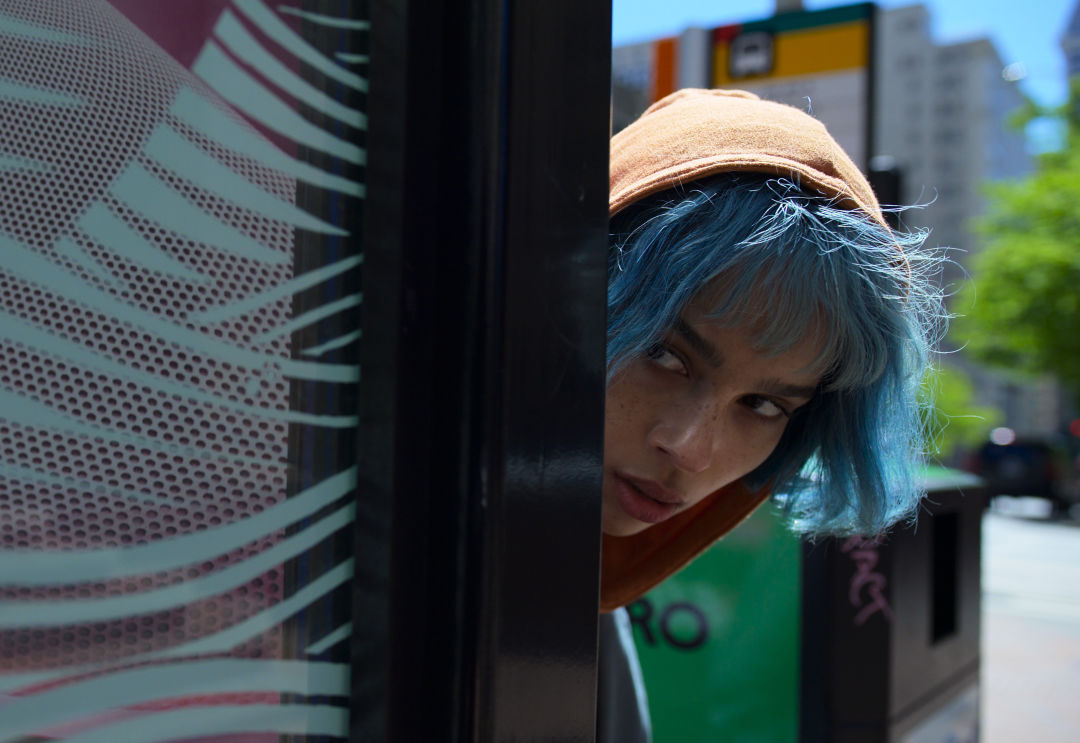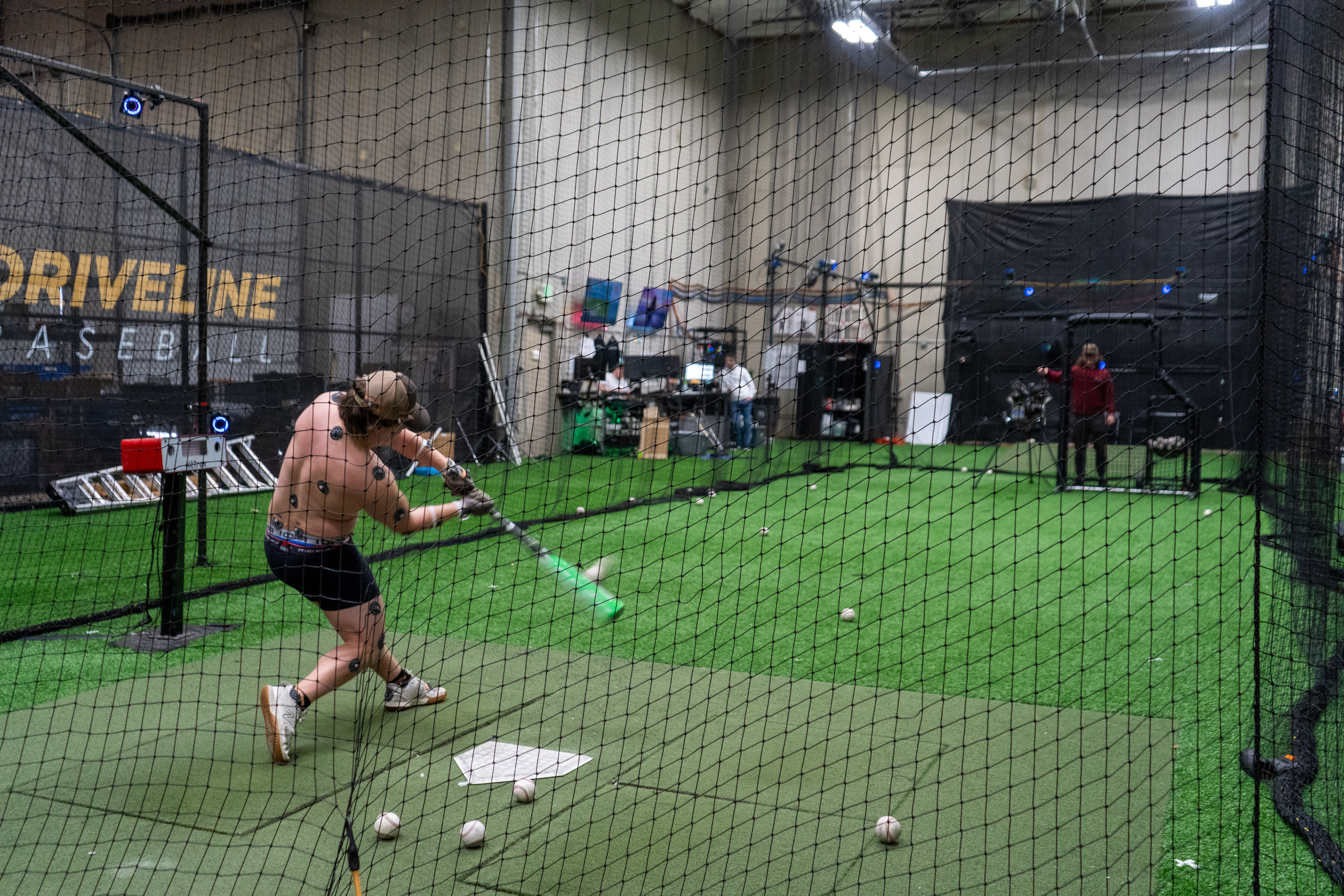Steven Soderbergh’s Kimi Holds a Mirror Up to Seattle

Note the King County Metro sign in the background. We aren't in Vancouver anymore, Toto.
Image: Courtesy Warner Media
In kimi, Zoë Kravitz stars as Angela, a tech worker living in Seattle whose agoraphobia has been aggravated by the pandemic to the point of being debilitating. Marooned in her stunning loft, with its soaring ceilings and glistening original hardwood, Angela spends her days sifting through audio gathered by an Alexa-esque home assistant device called “Kimi,” and manually resolving any errors the AI has made in interpreting natural language.
Our inciting incident comes along one day when, after bailing on a food truck date with her Hot Neighbor (he has a name, I think, but for all that his character is actually fleshed out we might as well just continue referring to him as Hot Neighbor), she stumbles upon chilling evidence of a violent crime.
Forced to confront the trauma of her past and leave her home, Angela must flee the long and grasping arm of an evil tech corporation to seek justice for the woman murdered by its deplorable CEO.
What Kimi Gets Right about Seattle
Where else other than in our fair city could a bottle of kombucha serve as a portent of imminent calamity? The bottle comes crashing to the ground hours after Angela sets it precariously on the edge of a counter, immediately after she hears the terrifying audio clip of the woman’s murder, and now I’ll never look at a strawberry lemon Kevita 'buch in the beverage case at PCC the same way again.
While some of the interior scenes were shot in LA, the movie was actually filmed on the streets of Seattle, which gives it major points for accuracy over the many movies in which Vancouver stars as the Emerald City. Kimi also establishes its setting with a number of subtle yet effective flourishes, like a framed poster on Angela’s wall from a show at Benaroya Hall.
Much more interesting, however, are the ways in which Kimi roots itself in Seattle thematically. Surveillance is perhaps the most prevalent motif; everyone is being watched at all times, whether by their Creepy Neighbor (not to be confused with Hot Neighbor, who Angela peeps on herself) or a tech giant eager to squeeze their data for profit.
Whatever naive notions Angela has of a right to privacy and protection from these insidious corporate forces should be disabused early on: “But you can’t access user data with a device number,” she bleats earnestly, when her Romanian hacker friend urges her to do just that to find the identity of the woman in the damning recording.
“Of course you can. Who says you can’t?” he replies.
“Someone at corporate.”
“Well, they lied.”
But Angela just doesn’t get it. A number of other moments like this, which are almost too overt in their social commentary to be effective, pepper the movie. Angela is shocked and appalled to learn that her employers have covertly gathered a scan of her retina during virtual meetings.
“It’s in the terms and conditions of the conference software,” she is told with smug condescension.
“Nobody reads those!” she protests, wide-eyed. You get the picture.
What’s particularly interesting about this persistent credulity is that Angela is a tech worker; we learn that she used to work for Facebook, for Zuck’s sake. She should, one might argue, be uncomfortably aware of the reality of her employer's disregard for privacy, especially if we’re to believe that this is a world in which Cambridge Analytica and the Facebook Papers are a thing. The movie even directly references the 2017 murder case in Arkansas that hinged on evidence gathered by an Echo smart speaker. But maybe Angela's dogged, almost willful ignorance is more true to life than we’d like to admit. I would definitely convince myself that my employer wasn’t abjectly evil, too, if they paid for that apartment.
What Kimi Gets Wrong about Seattle
Kimi portrays a socially awkward tech worker who keeps inviting her neighbor over for casual sex but gets squirrelly whenever going out on an actual date comes up. I commend the film for being progressive enough to make this otherwise very realistic character a woman. This is what feminism looks like, people, take notes.
Best Evil Tech CEO™ Sound Bites
“This is happening too fast.” In reference to a plot to murder Angela to keep her quiet. I mean, the IPO is tomorrow! He doesn’t have time for this!
“What the fuck is wrong with these people? Everybody is in everybody’s business.” In reference to protesters. So deliciously ironic. *Chef’s kiss*
“Kimi understands you better today than it did yesterday because of our people…. It’s actually the fastest way to get better fast, if that makes any sense.” Said to a reporter to explain why Kimi needs to listen to and keep a record of your every last utterance. No, it doesn’t make sense. Also, I thought this was all happening too fast. Make up your mind.
Is Kimi a Seattle Movie?
In all (well, some) seriousness, Kimi does a very good job of portraying a certain, albeit rather narrow, side of the city. In two and a half hours, it comes closer to capturing Seattle—the Seattle of today, not a nostalgia-tinged account of a grungy Seattle of the '90s—than any movie I’ve seen, complete with a protest over sweeps of houseless encampments in which Angela gets embroiled. Conspicuously absent from the film: actual people experiencing homelessness.
The Grade
Five out of five sinister kombuchas.




